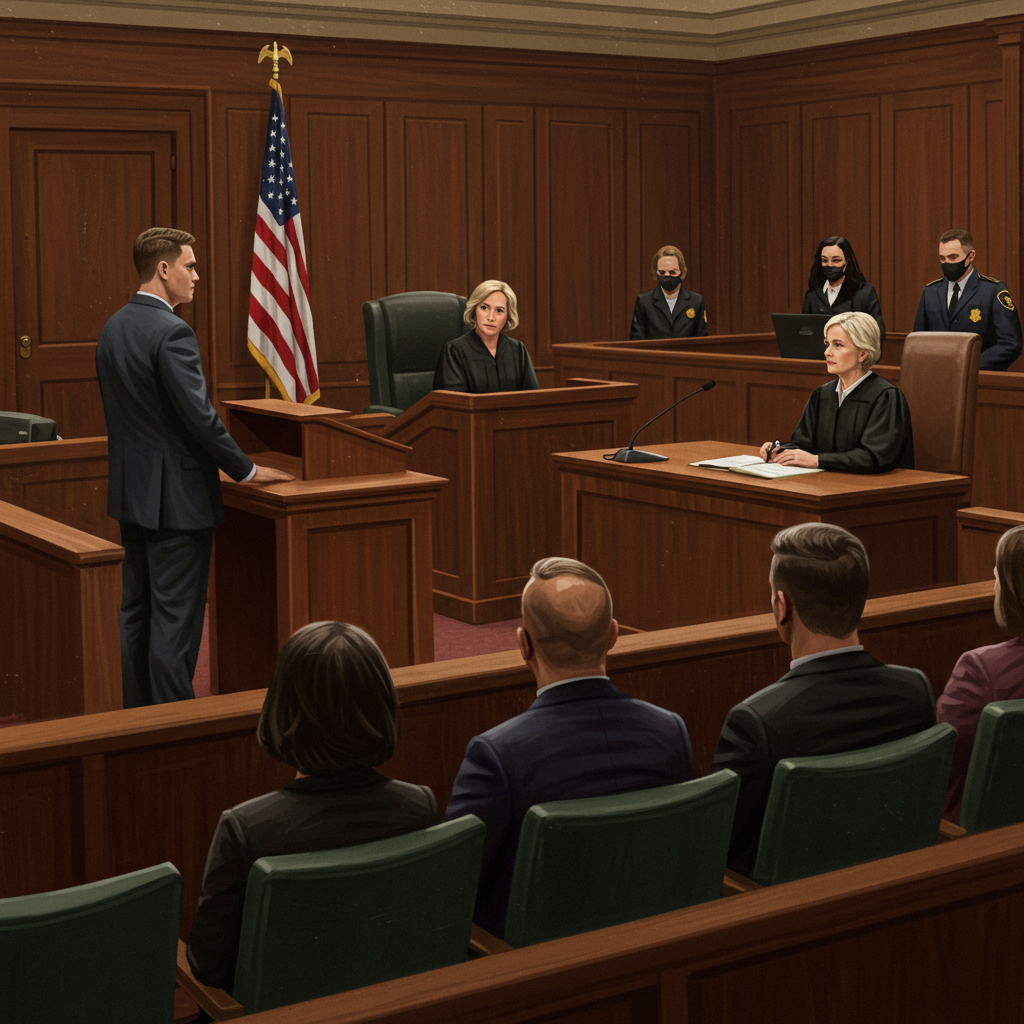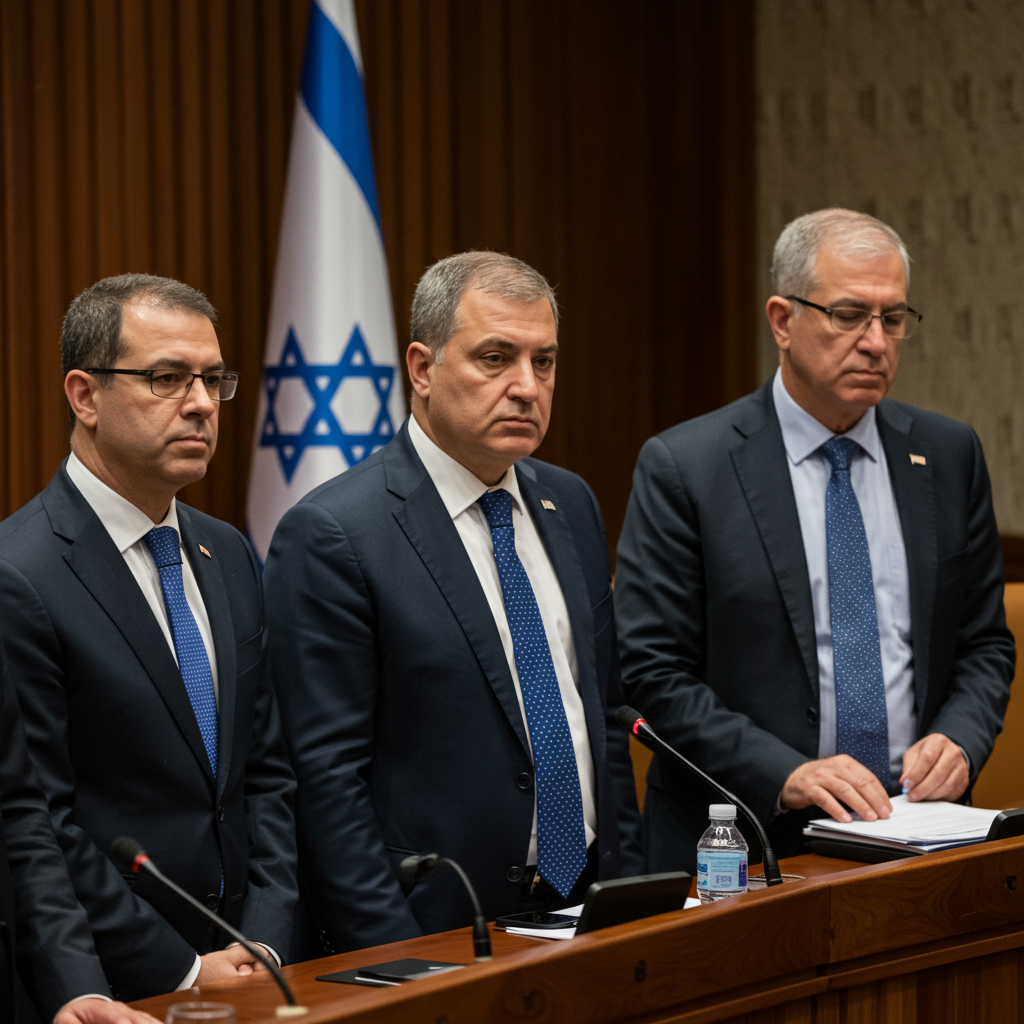The legal saga surrounding the tragic 2022 slayings of four University of Idaho students reached a stunning and pivotal conclusion. On July 2, 2025, Bryan kohberger, the man accused in the brutal stabbings, formally entered a guilty plea. This dramatic development unfolded as part of a carefully negotiated agreement designed specifically to remove the possibility of capital punishment, a sentence prosecutors had actively pursued.
District Court Judge Steven Hippler officially approved the plea arrangement. This decision effectively sidesteps what would have been a potentially lengthy, emotionally draining, and complex jury trial. Instead, Kohberger now faces a sentence of four consecutive life terms in prison without the possibility of parole. This harsh outcome aims to ensure accountability for each young life tragically lost. It also guarantees he will spend the remainder of his life incarcerated. An additional 10 years were reportedly added to his sentence for the burglary charge connected to the Moscow, Idaho crime scene. As a standard component of the deal, Kohberger also waived most of his rights to appeal. Such waivers are common in plea agreements, aiming to bring faster finality to the legal process. They also prevent decades of potential post-conviction challenges. These challenges could prolong the agony for the affected families.
Unpacking the Unexpected Plea Deal and Its Terms
Bryan Kohberger’s guilty plea brought an abrupt halt to the high-profile legal case. The development occurred only weeks before his trial was scheduled to begin in Boise. The case had been moved from Latah County due to extensive pretrial publicity. The approved agreement solidified the outcome: Kohberger pleaded guilty to four counts of first-degree murder. The victims were Madison Mogen, 21; Kaylee Goncalves, 21; Xana Kernodle, 20; and Ethan Chapin, 20. He also admitted guilt on one count of burglary related to the crime.
In exchange for this admission of guilt, prosecutors agreed not to seek the death penalty. Judge Hippler sentenced Kohberger to the four life sentences, to be served one after the other. He also imposed the additional 10 years for the burglary charge. During the hearing, Kohberger reportedly affirmed under oath his understanding of the charges and the agreement. He stated he was not coerced into the decision. Critically, he also reportedly testified he was pleading guilty because he is guilty. When asked specifically by the judge if he had murdered the victims “willfully, unlawfully, deliberately with premeditation and malice of forethought,” Kohberger answered “yes” repeatedly.
Why Bryan Kohberger Chose to Plead Guilty
The most prominent motivation behind Bryan Kohberger’s decision to plead guilty appears centered on a clear strategy to avoid a potential death sentence. Reports suggest the possibility of execution, including Idaho’s planned use of the firing squad, weighed heavily on his decision. However, legal setbacks suffered by his defense team reportedly played a significant role in prompting the plea discussions as well.
Kohberger’s attorneys reportedly initiated talks about a plea agreement after facing unfavorable rulings in court. These rulings significantly limited their ability to present certain planned defenses. For instance, challenges to crucial DNA evidence linking Kohberger directly to the crime scene proved unsuccessful in court. Attempts by the defense to introduce theories about “alternate perpetrators” were also denied by Judge Hippler. The judge reportedly deemed these arguments “rank speculation” lacking any concrete evidentiary support. These substantial legal hurdles likely narrowed Kohberger’s options considerably. They made the prospect of facing a capital trial much more daunting for the defense.
Experts consulted on the case also offer insights into the plea from a psychological viewpoint. Some behavioral criminologists suggest Kohberger’s plea was an act of control. By entering a guilty plea, Kohberger arguably regained a measure of power over his own fate and the unfolding narrative. He avoided the intense public scrutiny and unpredictable outcome that a capital trial would have brought.
Key Evidence Prosecutors Were Ready to Present
Had the case proceeded to trial, prosecutors were prepared to present substantial evidence. This evidence aimed to link Kohberger definitively to the quadruple murders. During the plea hearing, Latah County Prosecuting Attorney Bill Thompson outlined key pieces of this evidence. This included digital forensic evidence showing Kohberger’s cell phone activity. Records showed his device was in the vicinity of the victims’ residence at 1122 King Road approximately 23 times in the months leading up to the killings. However, prosecutors reportedly lacked evidence of him making direct contact with the house during these prior visits.
Crucially, a Ka-bar knife sheath discovered on the third floor of the crime scene was a central piece of evidence. The sheath reportedly yielded single-source male DNA on its snap. Prosecutors linked this DNA directly to Bryan Kohberger. Furthermore, online shopping records reportedly showed Kohberger had purchased the same type of military-style knife and sheath from Amazon months before the murders occurred. Surveillance footage also allegedly captured a white Hyundai Elantra, matching Kohberger’s vehicle, leaving the area at a high rate of speed. This happened shortly after the estimated time of the killings in the early morning hours of November 13, 2022. Despite the compelling DNA evidence and Kohberger’s admission of guilt, the murder weapon itself has still not been recovered. Prosecutors reportedly believe Kohberger entered the home through a sliding door on the main floor. They surmise he then killed Madison Mogen and Kaylee Goncalves on the third floor first, before encountering and killing Xana Kernodle and Ethan Chapin.
Deep Divisions Among Community and Families
While Bryan Kohberger’s guilty plea brings a form of legal finality, it has starkly illuminated deep and painful divisions. These divisions exist among the victims’ families and within the wider affected community. For some families, the plea agreement sparked profound outrage and a sense of betrayal. For others, it represented a necessary and difficult path forward toward potential healing.
Steve Goncalves, the father of Kaylee Goncalves, has been particularly outspoken in his opposition to the plea. He publicly stated he felt “stunned” and “blindsided” by the news. He expressed that his family felt they were only vaguely informed about the possibility and lacked adequate input on the decision. Goncalves had strongly and consistently advocated for a jury trial. His aim was potentially seeking the death penalty for Kohberger. He viewed the plea as “anything but justice.” He described the deal as “hurried” and “secretive.” Jeff Kernodle, Xana’s father, echoed this deep disappointment. He saw the plea as a “missed opportunity.” A trial could have potentially deterred future crimes. It might have established a strong legal precedent. Crucially for him, a trial might have provided more detailed answers about what happened.
A major point of contention for families like the Goncalves and Kernodles is that the plea agreement reportedly did not require Kohberger to provide a full confession. It also did not require him to share specific details about the crime. This includes crucial elements like his motive for the killings. It also leaves open questions about whether any victims were specifically targeted. The location of the murder weapon also remains unknown. Details like these would almost certainly have been thoroughly explored and potentially revealed during a public trial. For families desperately seeking answers and a complete accounting of that horrific night, this absence is deeply frustrating and painful.
In significant contrast, other families expressed support for the plea agreement. An attorney representing Madison Mogen’s parents stated they backed the agreement “100%.” They viewed this outcome as the beginning of “a new path of hope and healing.” Ben Mogen, Madison’s father, specifically expressed relief. He felt the plea would spare him and his family from the constant disruption of court dates. This outcome allows them to focus on moving forward with their lives and grief. Ethan Chapin’s family also publicly supported the plea bargain. Their perspective highlights a desire to avoid the potential re-traumatization of a public trial. They reportedly wished to focus on processing their immense grief more privately. The intense and often intrusive media scrutiny surrounding the case added another layer of stress they wished to avoid. The wide range of reactions among the families was evident in court. Family members present during the plea hearing were visibly emotional. Some were seen crying as the judge read the victims’ names. Others wept as prosecutors detailed the evidence that would have been presented at trial.
Navigating Trauma and Grief: Expert Psychological Perspectives
Mental health professionals emphasize that the wide range of reactions observed among the victims’ families is both expected and entirely valid. Experts specializing in trauma and grief stress the unique and deeply personal nature of these responses.
They highlight that there is absolutely no single “right” or “correct” way to respond to horrific loss. How individuals experience, process, and express grief is highly unique to them. Circumstances involving young victims, sudden and violent crime, and a high-profile criminal case make the grieving process exceptionally complex. The trauma itself can severely violate a person’s innate sense of safety and fairness in the world. This often leads to profound feelings of powerlessness after already suffering an unimaginable loss. For some, seeking justice through a public trial feels like an essential opportunity. It can represent a way to regain some control or ensure accountability. It also offers the potential for answers a plea might not provide.
However, experts also fully acknowledge the validity of the opposing perspective. A public trial would necessitate reliving the horrific details of the crime repeatedly for a jury. This process carries a significant risk of causing further psychological trauma to the families involved. The intense and often intrusive media scrutiny surrounding such a high-profile case adds yet another layer of significant stress and burden. For some family members, avoiding this agonizing ordeal and allowing the legal process to conclude quickly via a plea deal may feel like the less painful or damaging option. It potentially enables them to focus on their personal healing process. This can happen away from the spotlight and constant public attention. Ultimately, mental health professionals urge compassion, empathy, and non-judgment toward all family members. They recognize the depth of trauma they have endured. They also validate the individual paths each person must take toward coping and healing.
Inside the Mind: The Psychology Behind the Plea
Experts consulted on this case have offered valuable insights. These relate to Bryan Kohberger’s potential motivations and psychological makeup. Behavioral criminologists and legal experts describe his actions, including both the crime itself and the eventual guilty plea, as potentially driven by a profound and disturbing need for control.
The murders are often viewed by these experts not as crimes of passion, but as calculated and deliberate acts. They suggest that traits like narcissism, detachment, and an overwhelming desire for dominance may have been significant factors at play. The reported planning, potential stalking behavior, and execution of the crime have been described as chillingly precise. Experts propose that Kohberger was reportedly fully aware of his actions. They suggest he was potentially “feeding an obsession.” He may have possessed a disturbing detachment from the consequences of his actions.
His guilty plea is viewed by some experts through this same lens of control. He maintained his denial for months. Admitting guilt only when it directly served his interest (avoiding the death penalty) is seen by some as a final act of regaining power over his future. It allowed him to control the immediate narrative of the legal outcome. Crime expert Jeff Guinn suggests that averting a public trial allows Kohberger to keep certain secrets about the crime private. This reportedly maintains an “air of mystery” and gives him the “upper hand,” in Guinn’s words. As long as he is alive and able to communicate from prison, he reportedly retains some power. He could potentially “spin the story” or offer selective information.
Experts predict that Kohberger’s life in prison will likely involve significant isolation. He may be held in protective custody due to the extreme notoriety of the case. This environment is characterized by near-constant surveillance and severely limited social contact. It represents a lifetime of psychological isolation. For someone allegedly driven by an overwhelming need for control, this loss of influence, audience, and basic freedom is seen as a significant and enduring consequence. Some reports even suggest he has attempted to write to victims’ families. This is often interpreted not as genuine remorse but potentially as continued manipulation or “psychological warfare.” Some call this a form of “duper’s delight.” It is where a perpetrator seeks to remain psychologically present and impactful in the lives of their victims or their families.
Seeking Closure in the Aftermath of Bryan Kohberger Guilty Plea
The conclusion of the legal case with the Bryan Kohberger guilty plea marks a significant milestone. It results in a life sentence without parole for the defendant. However, this legal finality does not automatically equate to closure for the victims’ families. It also does not necessarily bring closure for the wider community deeply affected by this tragedy. While Kohberger is now sentenced to prison, the emotional wounds for many remain profound and raw.
Families grappling with this immense level of trauma often seek different things on their deeply personal path toward healing. For some, the finality of the prison sentence, even achieved without a full trial, allows them to begin the arduous process of processing their grief. They can potentially do this without the looming stress of court dates, legal motions, and intense public attention. For others, particularly those who strongly wished for a trial, the lack of a required confession or detailed testimony in the plea agreement means crucial questions remain unanswered. Queries about motive, the precise sequence of events, and the location of the murder weapon persist. These lingering unanswered questions can pose a significant barrier to moving forward emotionally for some.
Mental health professionals consistently stress a critical point: the most important thing is for grieving individuals to feel heard and supported. This support should be offered without judgment, regardless of their individual reaction to the plea deal. As one expert noted, there is simply nothing one can say or do to magically take away the immense pain of such a loss. Simply being present, listening actively, and offering compassion are crucial forms of support. The journey toward healing from this level of trauma is deeply personal. It is fraught with complex, often contradictory emotions. It is also an ongoing process for everyone who was impacted by the senseless loss of Kaylee Goncalves, Madison Mogen, Xana Kernodle, and Ethan Chapin.
Frequently Asked Questions
What were the specific terms of Bryan Kohberger’s guilty plea and sentence?
On July 2, 2025, Bryan Kohberger pleaded guilty to four counts of first-degree murder and one count of burglary. These charges were related to the November 2022 deaths of four University of Idaho students. The plea agreement, approved by Judge Steven Hippler, stipulated that prosecutors would not seek the death penalty. In return, Kohberger received four consecutive life sentences in prison without the possibility of parole. He also received an additional 10 years for the burglary charge. As part of the deal, he waived most rights to appeal.
Why were some victims’ families upset about the plea deal?
Families, including those of Kaylee Goncalves and Xana Kernodle, expressed significant anger and disappointment. They had hoped for a public trial that could have potentially resulted in the death penalty for Kohberger. A major point of contention was that the plea agreement did not require Kohberger to confess or reveal specific details about his motive or the location of the murder weapon. Some families felt they were not adequately consulted about the plea and believed the deal was hurried and did not deliver full justice.
What do experts say about Bryan Kohberger’s potential motivation and the plea?
Experts consulted on the case, including legal analysts and behavioral criminologists, suggest Bryan Kohberger’s actions, including the crime and his plea, may stem from a strong need for control. They often describe the murders as calculated, potentially linked to traits like narcissism or detachment. His guilty plea, made after months of denying involvement, is viewed by some as a final act of control. By pleading guilty, he avoided the uncertainty of a trial, guaranteed he would not face execution, and maintained some control over the narrative and unanswered questions about the crime.
—



